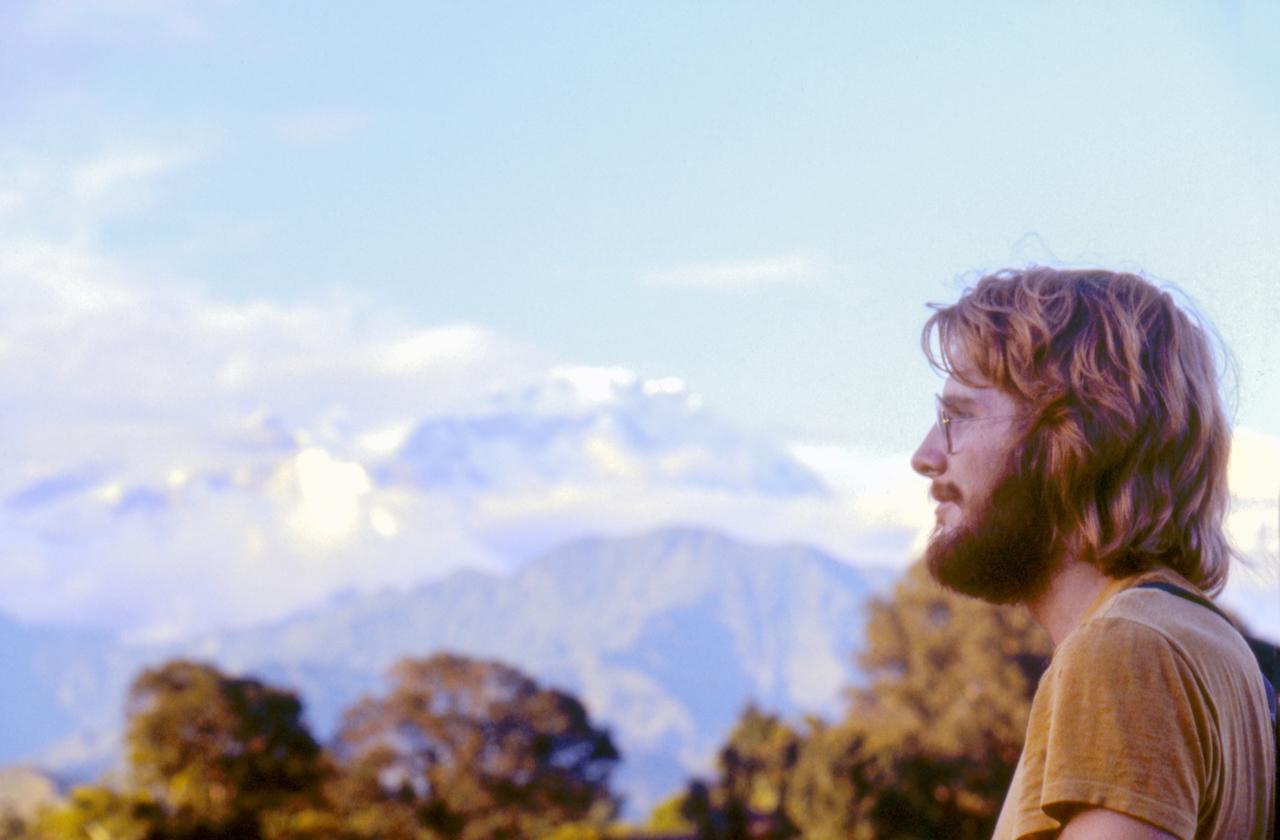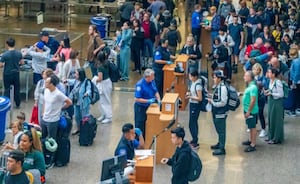Rick Steves in Nepal, 1978.
© Rick Steves’ Europe (www.ricksteves.com)
Rick Steves—best-selling author, renowned guidebook guru, popular public television host and radio personality who founded and heads the impressively successful group-tour company Rick Steves’ Europe, which leads more than 30,000 vacationers annually abroad—astounds once again with his latest book, On the Hippie Trail: Istanbul to Kathmandu and the Making of a Travel Writer (Avalon Travel, Hachette Book Group).
.
.
The origin of this singular, coming-of-age memoir springs from a remarkable hard-cover journal that Steves, during the summer of 1978, toted along a 3,000-mile stretch of horizon-unfolding experiences in Turkey, Iran, Afghanistan, Pakistan, India and Nepal (see route map below) on what was then called the Hippie Trail—an overland trek from Europe and West Asia through South Asia. Notable for its cheap-budget lifestyle and an alternative hippie subculture that interacted more readily with locals than traditional tourists did, the trail held legendary allure, spotlit by the Beatles’ 1968 trip to study with Maharishi Mahesh Yogi in Rishikesh, India. Ripe for meaningful exploration through mysterious lands, 23-year-old Steves was a recent college graduate and piano teacher from Washington State. En route, he daily penned 1,000 words, chronicling a vast expanse of observations and interactions. Returning home, his well-worn pages brimmed with 60,000 words. Soon after, the travelogue was tucked into storage and forgotten. Forty-two years later, during the COVID-19 pandemic lockdown, Steves stumbled upon his diary, rereading passages about his formative trip. A personal anthropological dig. His hand-written script was transcribed into type and lightly edited. The resulting 2025 published narrative stays true to Steves’ early emerging voice and enthusiastic purview: candid, curious, earnest, empathetic and hopeful. It exudes the transformative power of travel. An unvarnished, very readable revelry. Photographs—from an era when each camera snapshot was carefully considered because film rolls were limited and costly to develop—enrich his in-the-moment, on-the-spot reportage.
Rick Steves and Gene Openshaw traveled overland from Istanbul to Kathmandu during the summer of 1978.
© Rick Steves
Steves was accompanied by his friend Gene Openshaw, an ideal travel companion. Cellphones, GPS, apps, personal computers, social media, online recommendations and digital reservations did not yet exist. In their rucksacks, the duo packed a foldout paper map of the itinerary, few clothes and ample medicine (antibiotics, malaria pills, iodine drops for the water).
Openshaw and Steves on the Pakistan-Indian border.
© Rick Steves’ Europe (www.ricksteves.com)
This fresh-faced leap into the unknown catapulted Steves and Openshaw toward wisdoms beyond their years. They were free, determining their own paths, facing their own consequences. Unable to stay in touch with loved ones in the United States, they relied on themselves. There were no guidebooks about this region, nor an ability to make advance bookings—so they slept among a patchwork of accommodations, often searching and scrambling for overnight cover. Their Western values encountered distinctly different cultures and characters, the collision of which fortuitously instilled wonder and humility.
Steves and Openshaw in Kashmir, the northernmost geographical region of the Indian subcontinent.
@ Rick Steves’ Europe
The monsoon season soaked them in Delhi. They fought off leeches and biting winged insects. Bumped and bustled on scruffy buses, crowded trains and narrow rickshaws. Dodged mischievous monkeys. Witnessed chaos and repression. Faced myriad complexities. Peered at ramshackle neighborhoods and broken roads. The poverty was jolting, heart-breaking.
Visiting a village outside Delhi, Steves relieves a local woman of her load.
© Rick Steves’ Europe
They also rejoiced at the sublime beauty of picturesque landscapes. Cherished unexpected embraces, uplifting connections and formidable kindnesses. Made friends in Tehran. Got high for the first time in Afghanistan, which they departed via the mountainous Khyber Pass, navigating through Waziristan, an ungovernable region where Pashtun tribes set their own rules and strong-armed their own defenses. Rode elephants and ponies. Boated the milky Ganges River. Were awed by the strikingly white marble Taj Mahal, a monument to romance. Hiked the Himalayas. Floated on a dreamy Kashmir Lake houseboat. In Kathmandu, they exchanged namaste greetings with villagers in a lengthy, slender settlement and up a ridge overlooking a pastoral valley. Sweeping his vision across the panorama, Steves told Overshaw that he couldn’t remember ever being more contented, happy and at peace.
In Kashmir. “I’ve never met a family so disconnected from the rest of the world or so warm and welcoming,” says Steves.
© Rick Steves’ Europe (www.ricksteves.com)
At journey’s end, when Steves flew home and “dove into adulthood,” he explains: “In the wake of this adventure—having stoked my travel spirit—I made a decision that changed the trajectory of my life: I let my piano students go, turned my recital hall into a lecture hall and began a small travel business.” His pivotal seed was planted, aligning a passion that has brought an array of travel pleasures to millions of people.
Rick Steves’ Postscript: Toward Travel’s Future
Rick Steves today.
© Rick Steves’ Europe (www.ricksteves.com)
Steves and Openshaw were unaware at the integral crossroad of their lives that 1978 would be the last Hippie Trail summer. In 1979, the Soviet Union invaded Afghanistan and the Islamic revolution arose in Iran. Easy, friendly and safe passage through both countries slammed shut. The world has changed a great deal since then, yet Steves continues to rally travel’s impact to influence peace and partnership. Here, from the book’s postscript, his thoughtful highlights about spreading your wings.
• “Those same 23-year-olds are still out there. I frequently hear from young globetrotters who have ventured beyond ‘tourism’ to become friends with the world, and I’m inspired by their stories.”
• “I miss the days of ‘bon voyage.’ There’s so much fear these days. But the flip side of fear is understanding, and we gain understanding through travel. Travelers learn that fear is for people who don’t get out much; that culture shock is the growing pains of that broadening perspective.”
• “I’ve shared the lessons I learned on the Hippie Trail for over 40 years. And I’m an evangelist for the notion that good travel is more than bucket lists and selfies.”
• “I believe that if more people could have such a transformative experience—especially in their youth—our world would be a more just and stable place.”
• “Travelers understand that the big challenges of the future will be blind to borders, and we’ll need to tackle them together—as global citizens and as a family of nations. And most fundamentally, travelers know that the world is a welcoming place filled with joy, love and good people.”
• “Young or old, rich or poor, backpack or rolling suitcase, the best way to understand this is to experience it firsthand. To get out there to know our neighbors. To build not walls, but bridges.”
Steves bicycles in Afghanistan, where trucks were brightly painted.
© Rick Steves’ Europe (www.ricksteves.com)
To read a digital scan of Steves’ original hand-written journal, go here.










